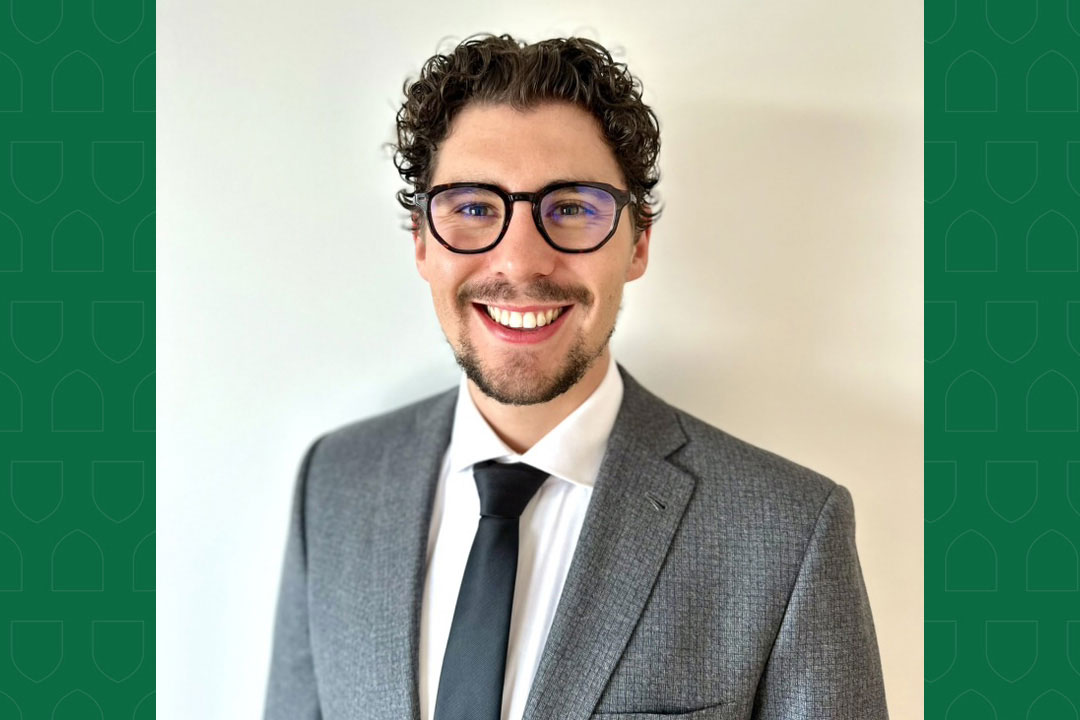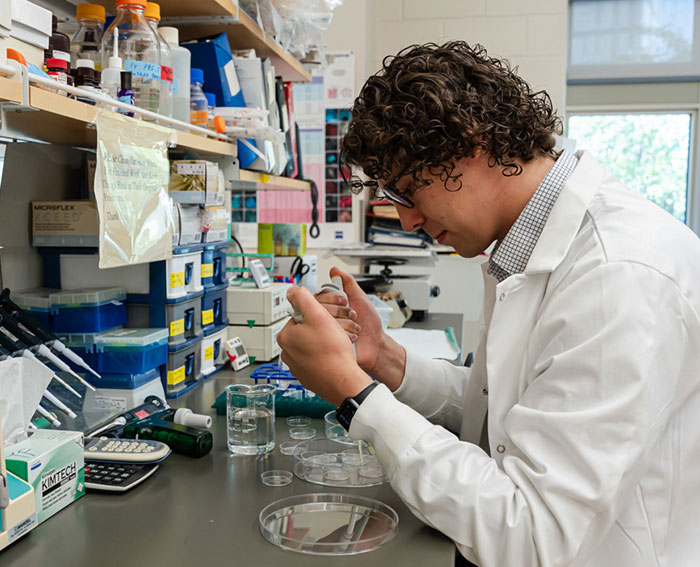
The MD-PhD path: Bridging medicine and research
Kirk Haan (BSc’20, MSc’21) is one of two students pursuing the Doctor of Medicine (MD) and Doctor of Philosophy (PhD) dual program at the University of Saskatchewan (USask).
The MD-PhD pathway is designed to train students as clinician-researchers, equipping them with the skills to practice medicine while also leading innovative research.
Having already completed two years of medical school, Haan is in his year of second year of research and then will return to the MD program to complete the final two years of the degree.
In April, Haan presented his research at the International Congress on Academic Medicine (ICAM) Conference in Halifax, where he earned the Gold Presentation Award and was also recognized as a student Gairdner awardee.
We asked Haan a few questions to learn more about his studies, research interests and career aspirations after graduation.
Could you share a bit about your educational background prior to medical school?

Before I started medical school, I completed an honour’s degree in physiology and pharmacology (BSc Hons) at the University of Saskatchewan from 2016-2020. I then continued the work I started as an undergraduate student and completed my master’s degree (MSc) in anatomy, physiology, and pharmacology in 2021.
I began my foray into research during the summer between the second and third year of my undergraduate degree under the supervision of Dr. Thomas Fisher (PhD), earning two Biomedical Summer Research Project scholarships from the College of Medicine. I have been fortunate enough to work in his laboratory and learn from him ever since. We focus on determining how the structural and functional adaptations of specialized neurons in the hypothalamus contribute to our ability to regulate blood volume and salt concentrations.
What motivated you to pursue a dual MD-PhD degree? How do you see these two areas working together in your career?
When I was accepted into medical school, I was just completing my master’s degree. Our laboratory was on the verge of making some significant breakthroughs in our field of research and I wanted to continue to be a part of that momentum. Since I began doing research, I knew that I would want to incorporate it into my career.
The MD-PhD degree path was a logical next step, because it would allow me to continue pursuing my research interests while simultaneously taking care of patients as a clinician. The further I have progressed in my studies, the more I realize that both basic science and clinical research drive medical practice, and the MD-PhD provides a unique opportunity to be at the forefront of it all.
You were awarded the Gold Poster Presentation Award and selected as a Gairdner awardee at ICAM. Can you share more about your research focus and the kind of areas are you exploring?
It was a great honour to be recognized as a student Gairdner awardee. I think that it reflects the quality of research that our College of Medicine can produce and is encouraging that our institution can compete with research giants like the University of Toronto or the University of British Columbia.
I was presenting some new and exciting data from my PhD work that looks at the changes in protein expression in specific neurons under states of dehydration. I am a basic neuroscientist by training, but the research our laboratory does falls within the field of neuroendocrinology. The cellular mechanisms we are exploring will help advance our understanding of how our bodies cope with dehydration and hypernatremia.
Because we have an aging population, dehydration and issues with salt and water balance are becoming more prevalent in the medical system. Our goal is that our contributions to the field will lead to better treatment strategies and therapeutic options when dealing with dehydration or salt and water balance.
How do you balance the workload between medical school and research?
The way the other current MD-PhD student and I have worked with College of Medicine leadership to build our dual degree pathways has fostered an environment that helps us focus on the task at hand. While completing our PhDs, we are supposed to focus mostly on research. Our degree pathway is a 2-3/4-2 program, meaning that you complete your first two years of medical school, then focus on the PhD portion for three to four years, and then return to clinical medicine for the final two years. During the PhD portion, it is expected that we keep up with our medical knowledge, and we are free to shadow and develop other clinical competencies while focusing mainly on our PhD work.
Completing both degrees simultaneously is no small task, and at times has felt overwhelming. However, I have an incredible support network that has helped me maintain an appropriate balance between my research and my clinical interests. My PhD supervisor and some of my clinical mentors have been especially gracious and supportive. Having one foot in each world has helped me see the importance of being involved in both and has galvanized my motivation to complete the dual MD-PhD program.
What are your long-term goals after you finish the MD-PhD program?
My clinical passion lies in the field of ENT/otolaryngology and has grown continually stronger since my first year of medical school. My hope is to match into an ENT residency program. ENT is a fascinating surgical specialty with a broad scope of practice, so I am not currently sure what area of ENT I would hope to subspecialize in clinically. ENT is a highly competitive specialty to match into, so I would be extremely fortunate just to be able to pursue a career in the field!
My basic science background provides an interesting complement to a surgical specialty like ENT. Ideally, I would maintain a clinical practice while operating a laboratory that engages in both basic and clinical research, to get a true ‘bench-to-bedside’ approach. I would hope to be able to collaborate with basic scientists and clinicians alike, and I think Saskatchewan is a burgeoning place that would be able to accommodate that.
What advice would you give to someone considering a MD-PhD program? Is there anything you wish you had known before starting?
I think that it is important to consider the commitment that is required to complete an MD-PhD. You are effectively delaying your ability to start practicing medicine by three to four years and finishing with a different medical cohort than you start with. Because it is such a large commitment, it requires lots of deliberation and career planning.
The difference in structure between medical school and graduate school is also something of note. Medical school is incredibly well-structured and there is generally a lot of student support and well-outlined dates for events and exams. Graduate school is largely self-directed. You schedule committee meetings, prepare talks, and must keep up with your data collection and the literature relevant to your field of research. You become part of a much smaller student body and what you research and learn is different from what the other graduate students in your department research and learn.
Since I had completed a graduate degree prior to starting medical school, I felt I had a solid grasp on what a PhD would look like, especially since I am completing it in the same department with the same supervisor. What I did not anticipate was the team-oriented feeling of being a medical student.
Graduate school is a great opportunity to become more independent and emphasizes self-directed learning. Medical school is an incredible opportunity to learn how to be a team player and to focus on delivering the best patient care possible. Synergizing the different approaches to learning and problem solving between medical school and graduate school has helped me develop the tools to approach both medical and scientific questions through a unique lens, which I hope will one day help me to provide better bench-to-bedside care.
Article originally published at https://medicine.usask.ca


